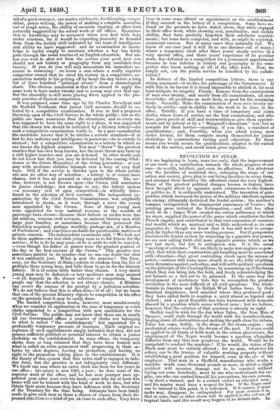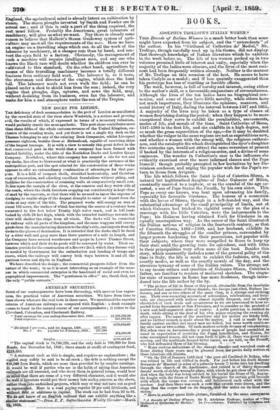REVOLUTION BY STEAM.
1VE are beginning to learn, none too early, that the improvement of one trade is a contribution towards the whole progress of our race—its wealth, intellect, and even its affections. For whatever sets the faculties of mankind free, enlarging the scope of our action and survey, gives play to our living faculties in every form, and amongst those faculties the affections stand the very highest. Many of the greatest political changes known in history have been brought about by agencies quite extraneous to the domain of politics as it is ordinarily understood. The invention of gun- powder, which increased the power of the military chieftain against his enemy, ultimately, destroyed the feudal system ; the mariner's compass extinguished the commercial supremacy of Venice ; the printing press initiated the Reformation —and. still has other work to do ; James Watt created the cotton millocracy at which we sneer, supplied the power of the purse which overthrew the first French empire, and contributed to that vast expansion of commer- cial wealth which we mistrust and as little understood as its own magnates do : though we know that it has still work to accom- plish far higher than any mere trading purpose. But if gunpowder abolished the feudal system by conjuring up a gigantic war power, we are now calling forth still more gigantic powers, which, as we saw last week, bid fair to extinguish war. It is the usual "meeting of extremes." We are likely, to make war engines so pow- erful, that while their construction and handling must be associated with education—that great controlling check upon the misuse of power,—nations will learn more clearly to see the folly of pitting mere dynamics against each other, and will settle military questions on the principle of the Clearing House, by a summing up of the forces which they can bring into the field, and freely acknowledging the net balance as a fact not to be gainsaid. In the same way the development of machinery bids fair to accomplish the greatest revolution in the most difficult of all civil questions. The Aboli- tionists in America and. the British West Indies have, by their fanatical impatience, bred mischief where they professed good ; they have called forth in reaction a spirit almost as bigoted and violent ; and a great Republic has been harrassed with domestic discord by a question which seems without issue ; but we believe, however, that the solution of that question is already in sight. Shelley used to wish for the day when Talus, the Iron Man of Spenser, could stalk through the world with his resistless:frame, beating down all obstructives and making the path clear for reform. Talus has come, bodily, in the shape of the steam-engine ; and mechanical science realizes the dream of the poet. If steam could be applied to all kinds of field-work in the cotton plantations, the employment of the Negro would become a question altogether different from any that now perplexes the world. Would he be competent to conduct the machine ? If he would, the status of the Black man must be entirely altered ; for no man, whatever his colon_ ,r can be the trustee of valuable working property without establishing a good position for himself, even in the eye of his employer. That man in a Sheffield manufactory who works a machine worth some thousand pounds or more, in which a slight accident will occasion damage not to be repaired without laying out some hundreds must be one who understands biz en- gine, one who can control hundreds, his perceptions, his own actions,
—in short a trained, and to a certain extent an educated man. and his master must have a respect for him. If the Negro race can be trained to this point, it is redeemed. If it cannot, it must make way, disappear, be extinguished. For most certain it ,
that at some time or other steam will be applied to the culture of tropical lands, and this result may happen at no distant date. In England, the agricultural mind is already intent on cultivation by steam. The steani ploughs invented by Smith and Fowler are in actual use ; and if this is only a part of the thing required, the rest must follow. Probably the Americans, great inventors of machinery, will give us what we want. Nay there is already some reason to believe that Halkett's Steam Guideway system of agri- culture may meet all the requirements of the case. Here we have an engine on a travelling stage which can do all the work of the labourer by machinery, at a cheaper rate than by hand, and -eon- vert the open field to a factory. Obviously, the management of such a machine will require intelligent men, and nay one who knows the Black race will doubt whether its children can ever be cultivated to this standard, On the other hand, agriculture by means of this travelling machinery becomes a totally different business from ordinary field work. The labourer is, as it were, the steersman and director of the engine, which does the hard toil. The labourer needs not even walk the field ; he can be placed under a shed to shield him from the sun ; indeed, the very engine that ploughs, digs, upturns, and sows the field, may, without desisting from its business, even fan the labourer, and make for him a cool atmosphere under the sun of the Tropics.



























 Previous page
Previous page